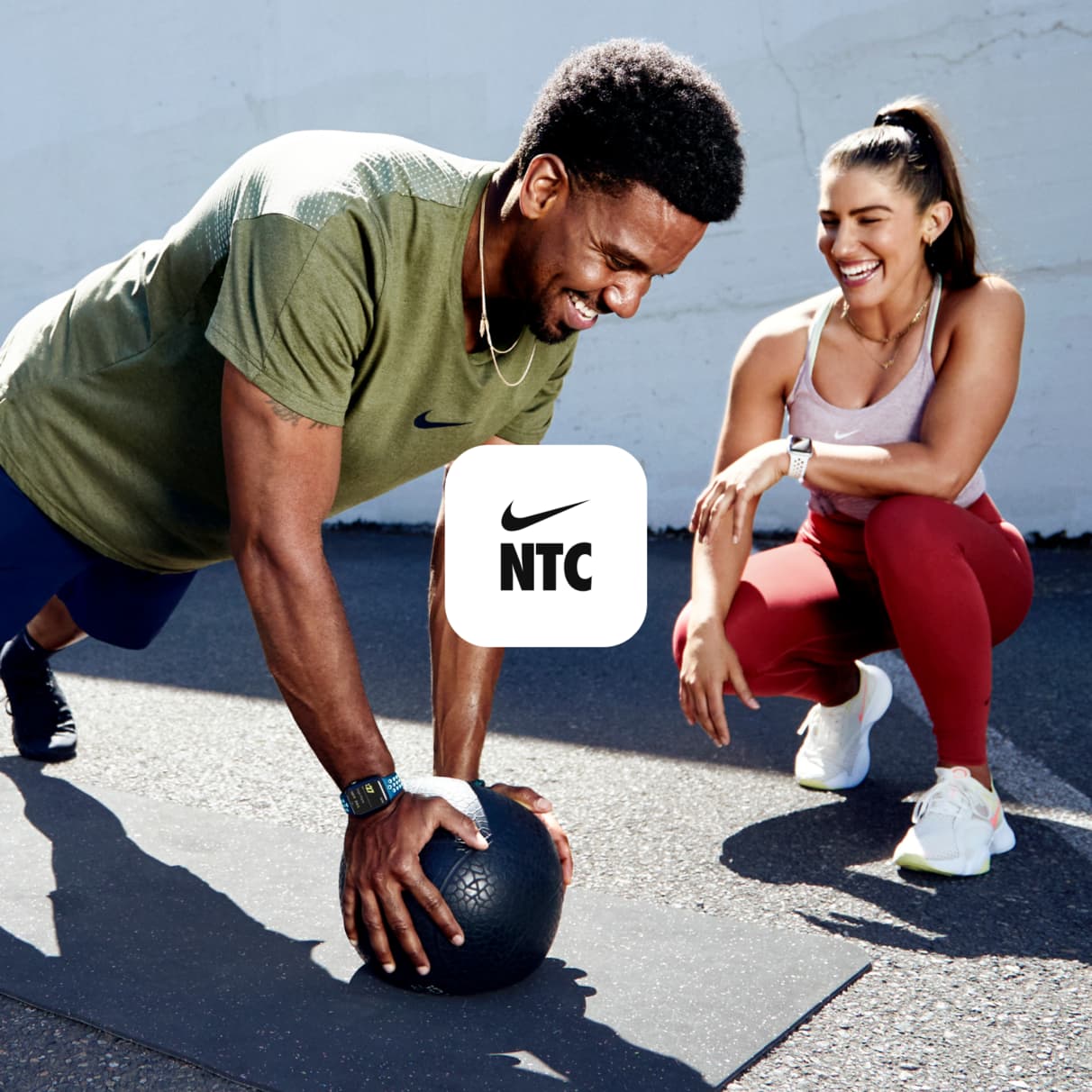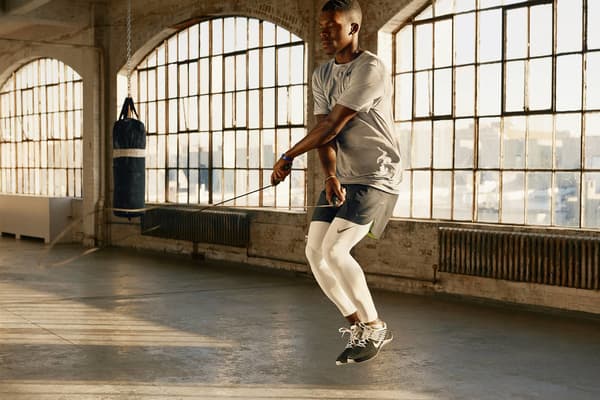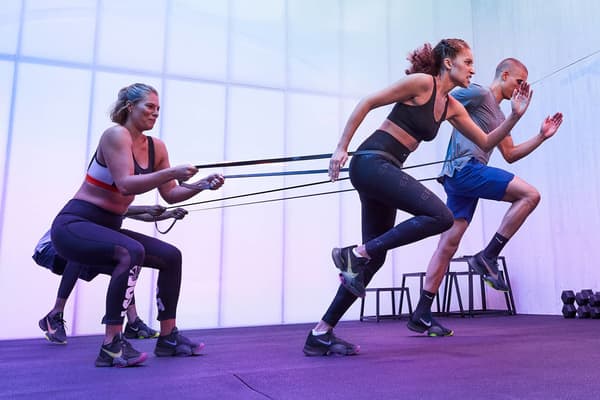How Long Is a Workout Supposed to Be?
Activity
From quick, high-intensity sessions to longer endurance days, learn how to time your workouts for maximum impact based on your goals and lifestyle.

Some days, you have the luxury of taking your time during a workout. Other days, you're squeezing in 10–20 minutes of cardio and core before moving on with your schedule. Both scenarios can support long-term health—what matters most is consistency and variety in how you move your body.
According to the most recent Physical Activity Guidelines for Americans, adults should aim for at least 150 minutes of moderate-intensity exercise or 75 minutes of vigorous activity a week. That can look like 30 minutes a day for five days, a few 20-minute sessions during the week plus a longer workout on the weekend or any mix that fits your lifestyle.
"Workout length depends on the person's goals", says April Medrano, CPT, vice president of programming, education and experience at STRIDE Fitness. "If someone has time constraints, then it's a matter of some activity is better than nothing".
How Long Should a Workout Be?
The real question is, does workout length matter? "This is a loaded question", says Mike Poirier, CSCS, vice president of fitness at The Edge Fitness Clubs. The short answer is that how long your workout should be depends on why you're exercising in the first place.
Think about your intention. Are you working out to stay healthy in the long term? Training for an endurance event like a marathon? Trying to build muscle strength quickly? Each of these goals requires a different balance of intensity, volume and frequency—all of which can influence the length of your sessions.
"When one thinks about progressive overload, there are various ways to accomplish this", Poirier explains. Intensity isn't time specific. Volume can be time specific based on rest periods. And frequency can mean doing shorter or longer workouts, but doing them more often, he says.
In other words, two people could train for the same amount of time each week yet structure their sessions differently—and both approaches can be effective. The key is choosing a duration that aligns with your goals, fits your schedule and allows you to stay consistent.
Benefits of Short Workouts (10–30 Minutes)
Short workouts that include quick bursts of energy and explosive movements—like HIIT workouts—tap into your anaerobic system, which targets the fast-twitch muscle fibres responsible for power, speed and explosiveness, Medrano says.
A 2025 review found that HIIT can significantly improve cardiovascular markers, such as blood pressure, vascular function and VO2 max, often in less time than steady-state cardio. The same review showed reductions in body fat and waist circumference, making short, intense workouts an efficient way to support both heart health and body composition.
"HIIT is great for efficiency", Poirier adds. "You train until you exhaust all metabolic systems", meaning these workouts push your body through multiple energy pathways in a very short time. But he notes that relying on HIIT sessions alone can make recovery challenging. Think about it: if you're always performing at or near your maximum effort, your muscles—and your central nervous system—never get the chance to fully recharge. Mixing in lower-intensity or longer sessions throughout the week helps maintain balance and reduce burnout.
So, when do short workouts work best? "Both short and long workouts have value", Poirier says, "But shorter, more intense sessions can fit weekday schedules better depending on your lifestyle".
Benefits of Long Workouts (45–90 Minutes)
Longer workouts give your body time to settle into a steady rhythm—and that's when aerobic adaptations occur. "Longer sessions let your cardiovascular system settle in and get stronger instead of just surviving short bursts", says Medrano. With more minutes to work, your metabolism "learns to work smarter, not harder", helping your body use fuel more efficiently.
This is also where you build real aerobic capacity. Medrano explains it this way: "Your engine literally upgrades itself". With sustained effort, your body grows more mitochondria—the energy factories that support power, stamina and long-term progress.
As your aerobic system gets stronger, recovery improves. You start bouncing back faster between sets, intervals and even full training days. Plus, long, steady sessions create a fitness base that makes hard workouts feel easier and helps your body handle more workload without burning out, Medrano explains.
In short, longer workouts are best for those who are endurance training and trying to build or challenge their aerobic capacity.
How Long Should You Work Out Based on Your Goals?
Your goals shape your workouts. Once you know what you're training for—whether it's strength, endurance or anything in between—you can tailor your session length to match.
Strength Training
If your goal is to build muscle mass, plan for 45–60 minutes per session. "To build muscle, you need quality reps and quality sets on repeat", Medrano says.
Strength-focused workouts don't always need to be long—just focused. "Intensity determines the timing", Poirier explains. If you're lifting heavier and resting well between sets, even 25 minutes can be enough to drive strength gains.
Aerobic Endurance
For endurance goals, your session length depends on what you're training for, but 45 minutes or more is a good place to start. Longer bouts give your cardiovascular system time to adapt and help you build the aerobic capacity needed for sustained efforts.
Research backs this up: a large study published in Circulation found that people who logged two to four times more than the minimum weekly-exercise recommendations had a significantly lower risk of dying from cardiovascular disease. Those who hit the higher end of moderate activity—about 300 to 600 minutes a week—saw the biggest benefit.
Your Move: Gradually Increase Your Workouts
It's tempting to go all-in on longer sessions or stack too many intense days in a row, but big jumps in duration or effort can make it harder for your body to adapt and may even increase the risk of injury. A gradual progression—a principle supported by the American College of Sports Medicine—helps you build strength and stamina without overloading your system.
Poirier and Medrano recommend letting your schedule and goals guide your training mix. Shorter, intense workouts might fit busy weekdays, whereas weekends allow for more volume.
"Training your body with a variety of different workout durations is an excellent approach for well-rounded fitness", Medrano says. "I would suggest a standard 45–60 min workout, two to four times a week, and introduce shorter metabolic conditioning (metcon) sessions once or twice a week". One longer-duration workout a week is plenty for most people, Medrano adds.
Frequently Asked Questions
Is a 10-minute workout enough?
Any amount of movement is better than nothing. One 2022 study from Nature Medicine found that, in older adults who don't have a structured exercise routine established, just a few 1–2 minute bursts of vigorous movement sprinkled into daily life for a total of about 3–4 minutes per day was linked with a noticeably lower risk of dying from cardiovascular disease, cancer and all causes.
For the average adult who only has 10 minutes for a workout, doing a speed walk, HIIT workout, core work or, as Poirier notes, targeting a single muscle group, can be beneficial.
Is it better to work out in short bursts every day or work out longer but less often?
There's no single "right" schedule—it depends on what fits your life and keeps you consistent.
Poirier emphasises that either approach can work. "My belief is consistency is best", he says. "What fits in your lifestyle and keeps you consistent will be the most effective". For some people, shorter daily sessions feel more doable. For others, stacking longer workouts a few times a week works better.
Medrano agrees that your routine should match your reality. If you're just starting to exercise, she recommends focusing on building the habit first; "Even five minutes a day counts", she says. "Consistency will always beat perfection".
Words by Cheyenne Buckingham





